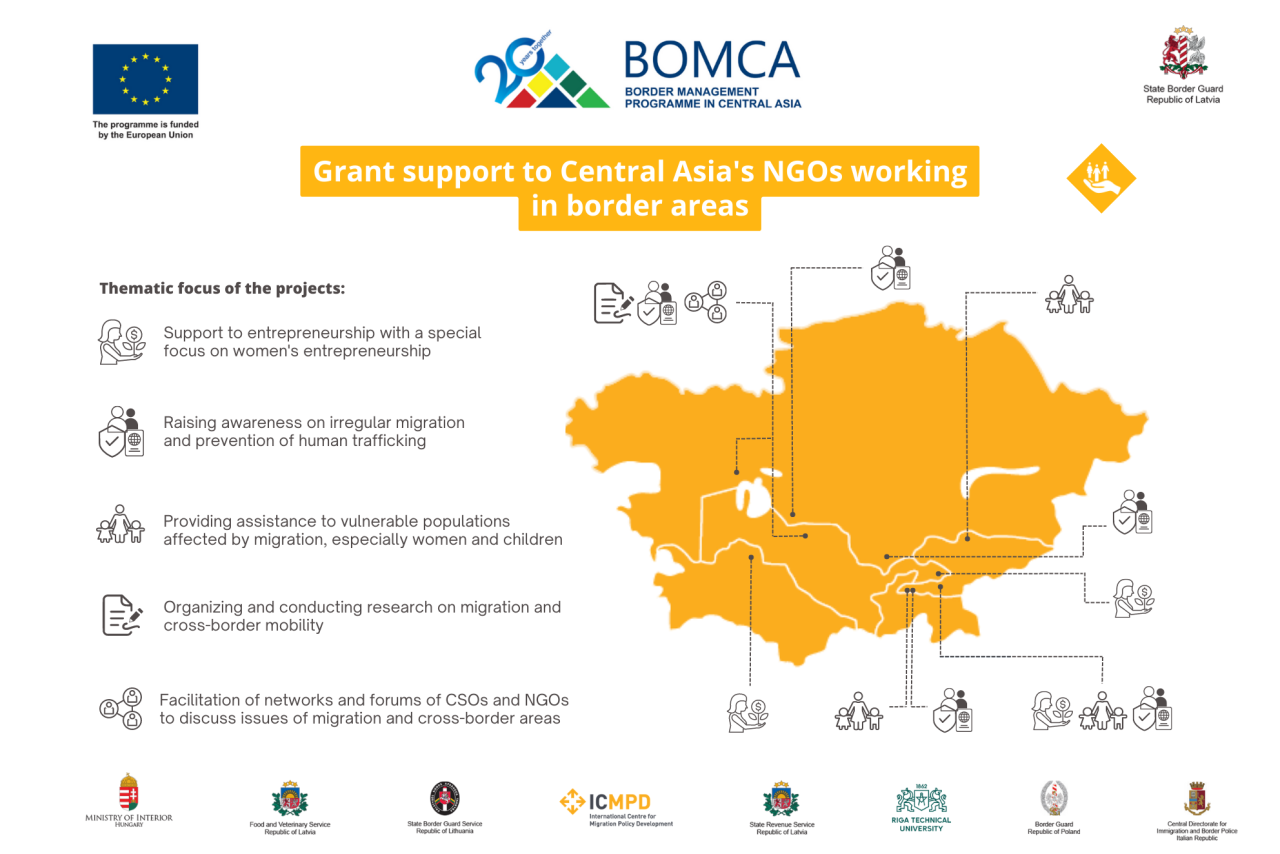The Border Management Programme in Central Asia – Phase 10 (BOMCA 10) selected nine actions for the benefit of border communities within its first Call for proposals among Central Asian NGOs, BOMCA reported.
In the framework of its first Call for Applications, BOMCA 10 contracted ten NGOs granting the EU funding worth over 300,000 Euro for implementation of actions across the Central Asian border areas.

The selected 6-12 months’ projects will support and empower border population who are at most risk to vulnerability such as migrants and their families, victims of human trafficking, women, youth and children. Furthermore, the selected Central Asian NGOs will reinforce their cooperation with local and state authorities and will strengthen their capacities in the implementation and monitoring of projects supported by the BOMCA 10 Programme.
The ‘Union of Economists of Turkmenistan’ will work with the youth in the border districts of Dashoguz region adjacent to Uzbekistan to enhance their entrepreneurship skills including in application of modern technologies and e-commerce. A specific focus on boosting cross-border cooperation with the youth from the Uzbek border region will bring benefits for the prosperity and improvement of living conditions of people from both regions.
In Kazakhstan, two organisations will be working with population residing in the regions bordering Uzbekistan. The Public Association ‘Centre of Legal Protection Zan Talaby’ will continue working on reducing irregular migration and human trafficking through legal support and awareness raising among vulnerable groups in Shymkent and in the Turkestan region. Whereas Public Association ‘Society of Women Small Entrepreneurs’ will focus on raising awareness about safe and legal migration in Kyzylorda region with particular attention to women migrants.
Four Kyrgyz NGOs will focus on support to the regions prone to high rates of emigration such as Chui and Talas regions in the North bordering with Kazakhstan and Batken and Osh regions in the South bordering with Uzbekistan and Tajikistan. The Public Fund ‘Global Changes Foundation’ will enhance capacities of vulnerable families in the border villages to boost their income through modern green entrepreneurship as well as will organise awareness raising activities to reduce cases of irregular migration. The Public Foundation ‘Insan-Leilek’ will support women living in the border areas and affected by migration to run and sustain small business and social entrepreneurship. The Public Association ‘Dialogue, Trust, Right’ will not only work on broadening economic opportunities for women left behind by migrants, but will also provide psychological support to their children through psychological assistance and special trainings for social teachers at schools. Likewise, the Public Foundation ‘Childhood Institute’ will work with social teachers to advance their skills in providing support to left behind children in the border region.
The Uzbek ‘Centre for Development of Well-Being of the Population of Fergana Taraqqiyot’ will be developing a model of an inclusive capacity-building programme, that will contain educational and empowerment tools for women living in the three districts of Fergana and one district of Andijan regions bordering with Kyrgyzstan. It is foreseen that the developed model could be next replicated in other border regions following the assessment of the project results.
Along with actions implemented by individual NGOs, the Kazakh Public Association ‘Echo’ together with the Uzbek Humanitarian legal centre will implement a joint project. Through the planned research activities, it will help to identify the needs and problems associated with migratory processes to improve living conditions of people residing in Mangystau, Kyzylorda and Turkestan regions of Kazakhstan and Jizzakh, Navoi and Tashkent regions of Uzbekistan. The findings will then be addressed together with local authorities and become publicly available for developing evidence-based programmes for local development. Also, a special attention will be drawn to the awareness raising on the rights of migrants and the risks associated with irregular migration.
In its 10th Phase, BOMCA pays particular attention to the improvement of cross-border cooperation aiming at improving living conditions of people in border areas with the focus on human rights, gender equality and vulnerable groups through enhancing capacities of the civil society and non-governmental organisations in providing support to local population living in border regions of Central Asian countries in the framework of the Component 4, implemented by International Centre for Migration Policy Development (ICMPD). ///nCa, 6 May 2023